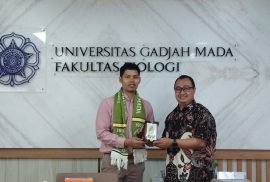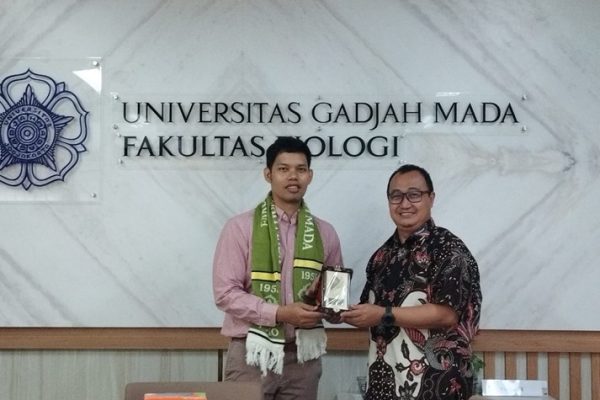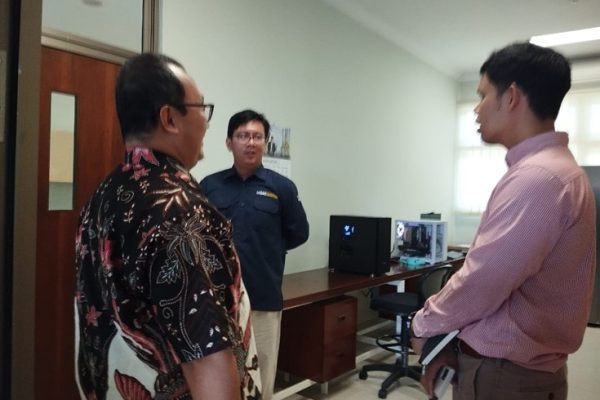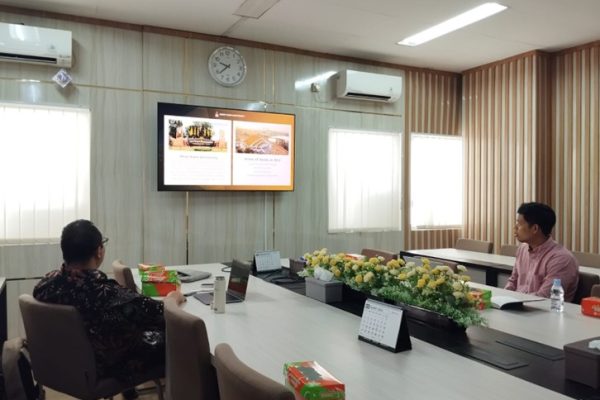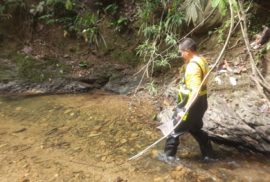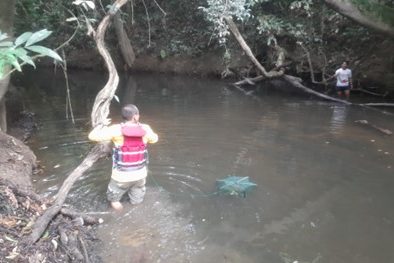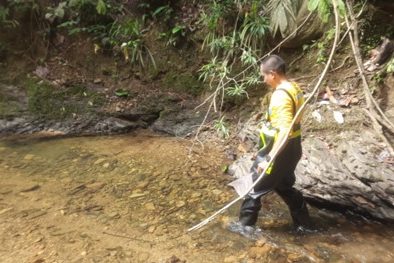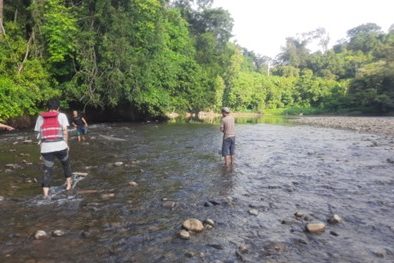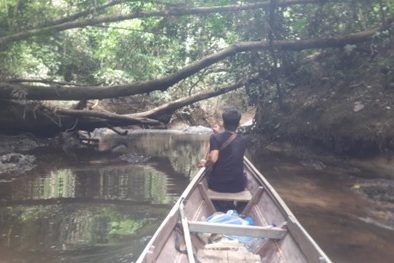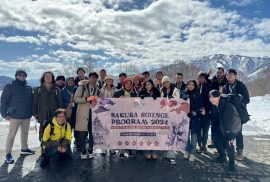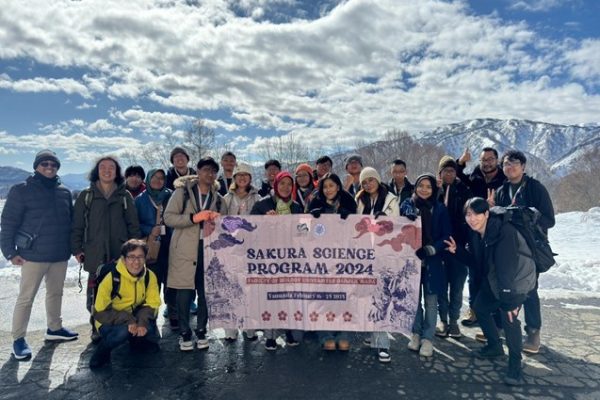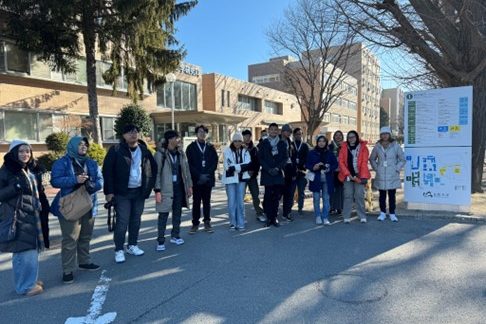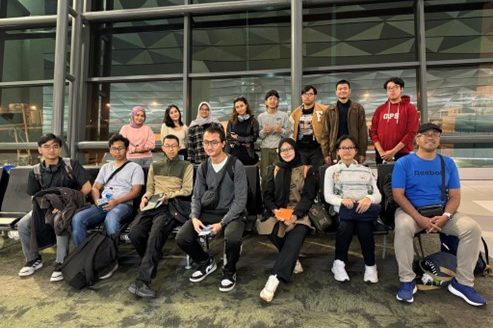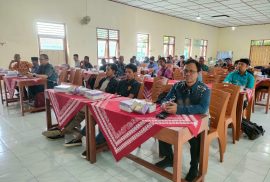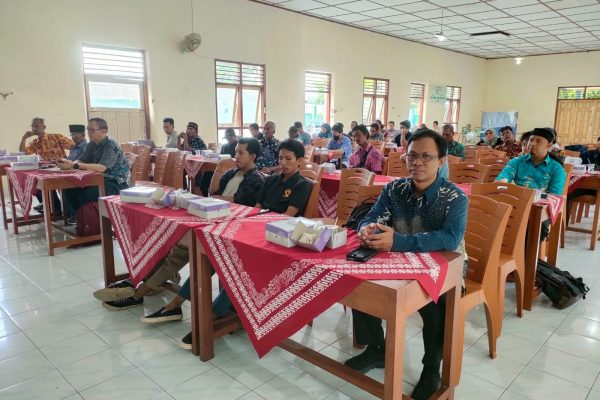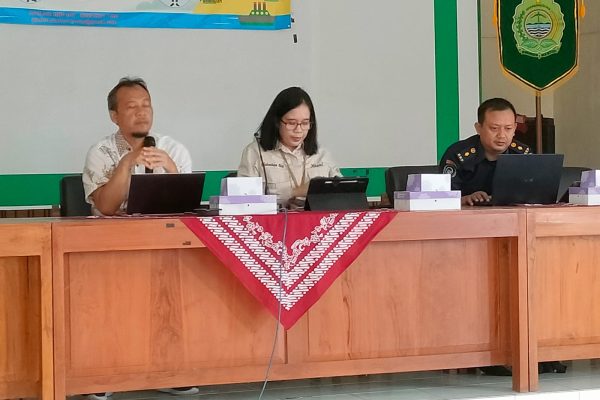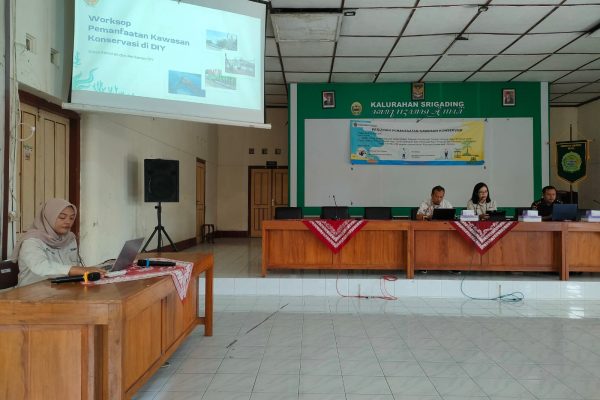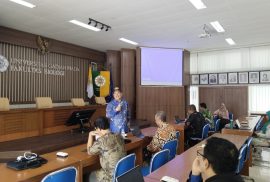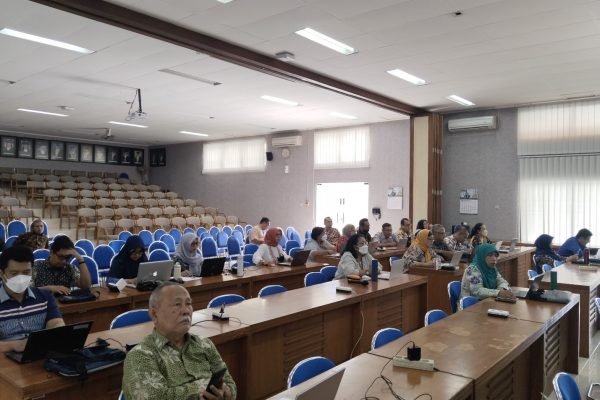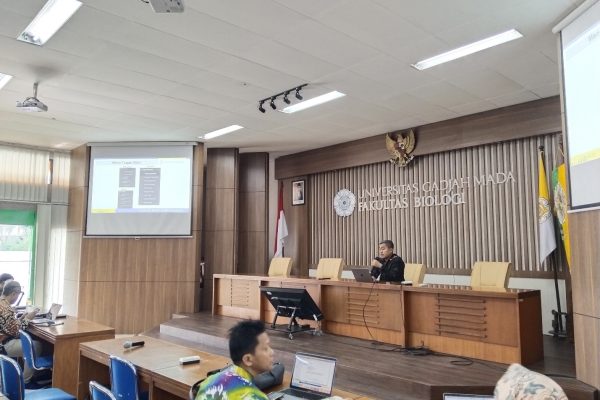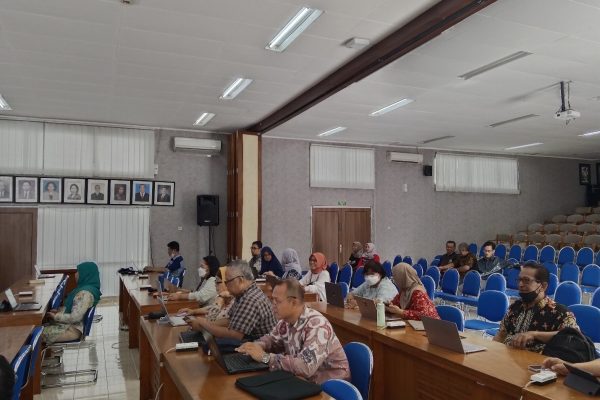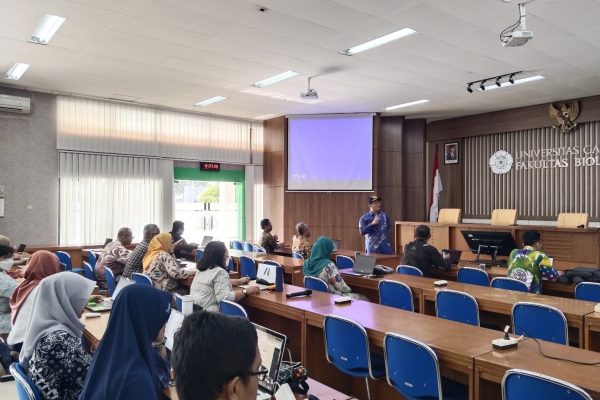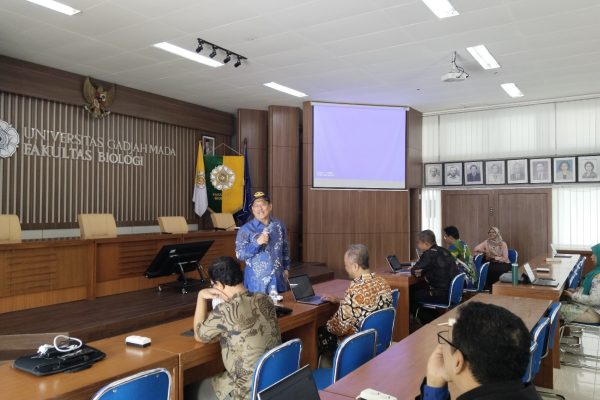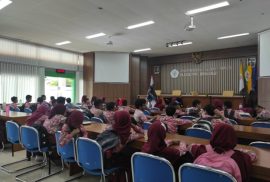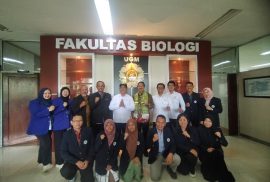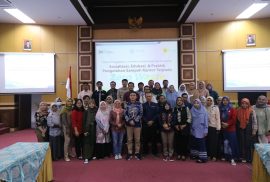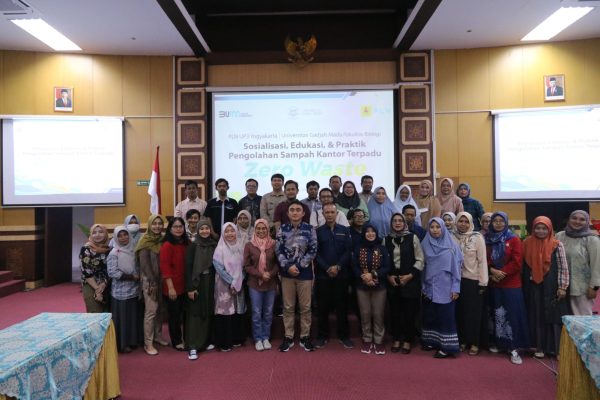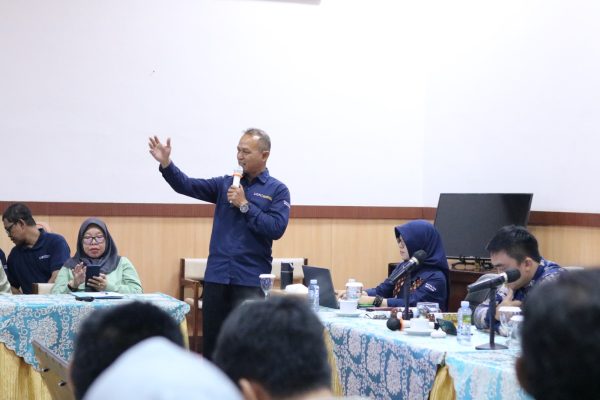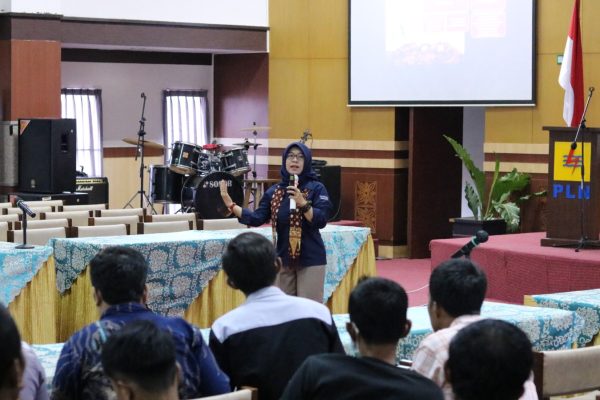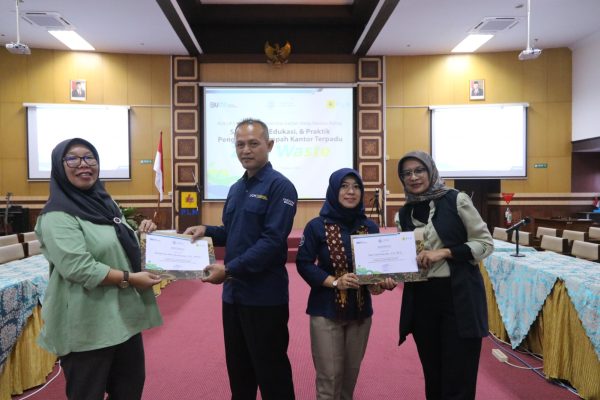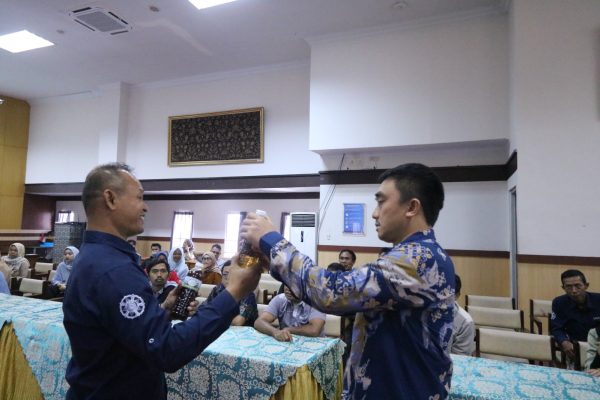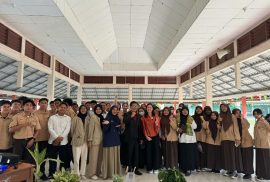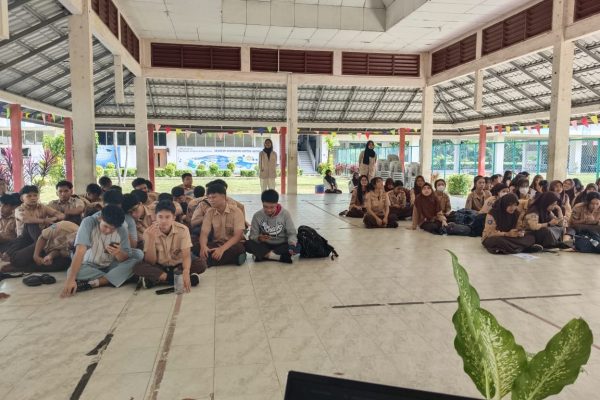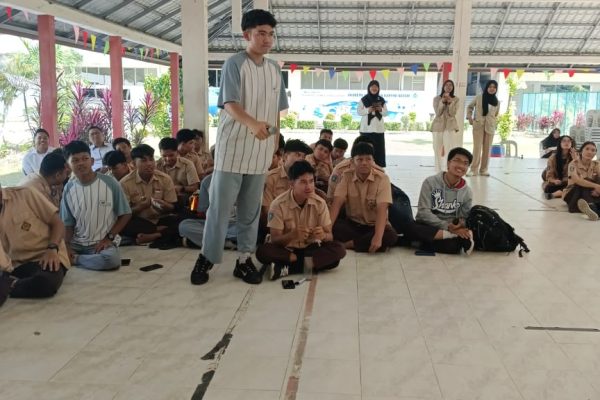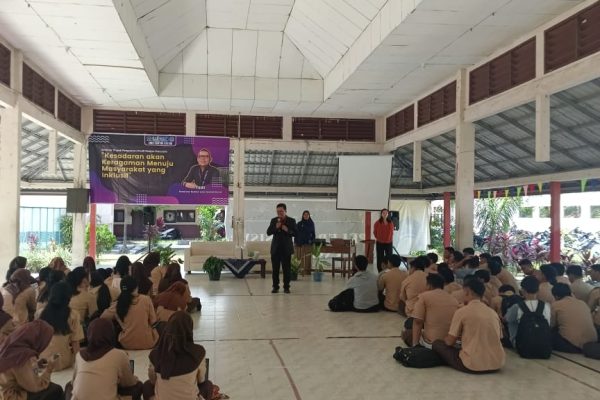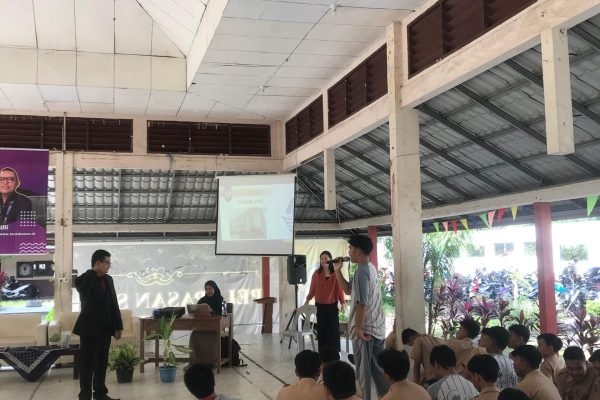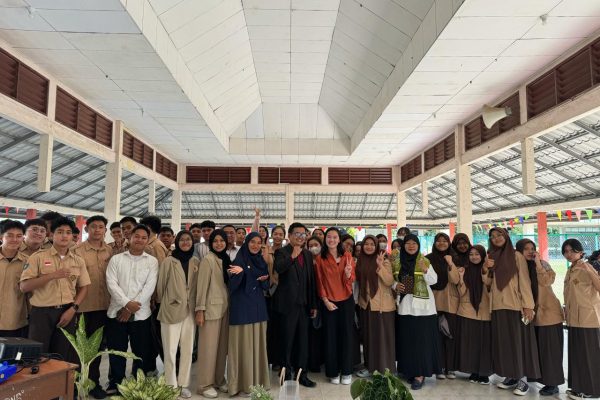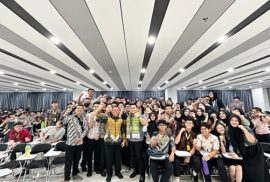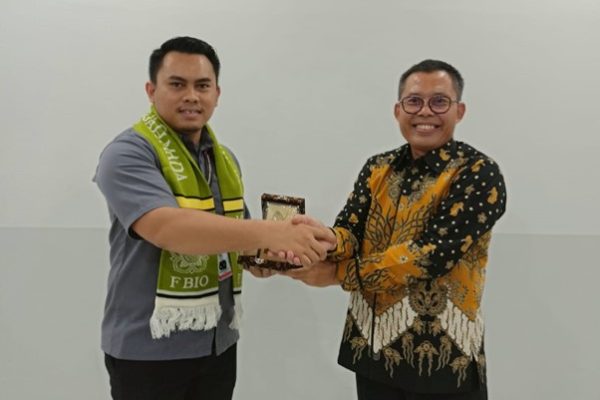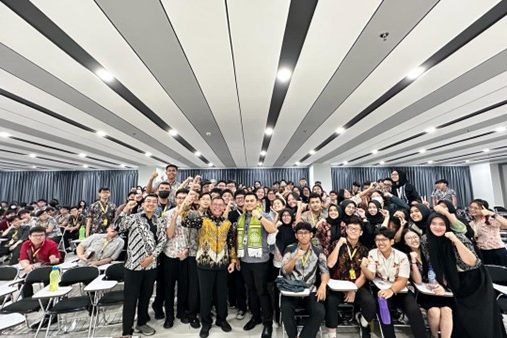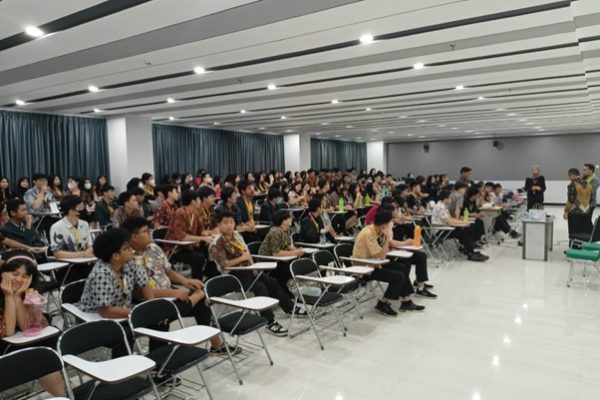Yogyakarta, 21 February 2024 – Faculty of Biology UGM received a visit from Dr. Shukum Ruangchai as Assistant Dean for International Relations and Communication of Faculty of Science, Khon Kaen University (KKU), Thailand. Located in the KPTU Faculty of Biology Meeting Room, Dr. Shukum was warmly welcomed by Dr. Eko Agus Suyono, M.App.Sc. Vice Dean for Research, Community Service, Collaboration and Alumni Affairs, Faculty of Biology UGM. Visit of Dr. Shukum is aims to initiating collaboration between Khon Kaen University and Universitas Gadjah Mada, especially the Faculty of Biology.
Dr. Eko as Vice Dean for Research, Community Service, Collaboration and Alumni Affairs of the Faculty of Biology then gave an explanation regarding the profile of the Faculty of Biology and the potential for collaboration that could be implemented with the Faculty of Science KKU. He also mentioned the ongoing collaboration with other universities in Thailand, including Kasetsart University and Prince Sonkla University, through participation in the 2023 International Summer Course.
Dr. Shukum also introduced KKU, especially the Faculty of Science, which has bachelor’s, master’s and doctoral programs in biology, both regular and international classes. He also mentioned the lack of interest among Thai students in continuing their education to master’s and doctoral levels. It is felt that the potential for double degree collaboration for bachelor’s, master’s and doctoral programs that can be initiated with the Faculty of Biology UGM can attract the interest of students in Thailand and UGM students in Indonesia to continue their education. Dr. Shukum is also enthusiastic about being able to invite lecturers and students to participate in the International Summer Course at the Faculty of Biology.
It is hoped that the discussion and visit will be a good follow-up step in the collaboration between the Faculty of Biology UGM and the Faculty of Science Khon Kaen University Thailand. This collaboration also shows the Faculty of Biology’s commitment to expanding connections and collaboration with various partners to improve the quality of education, in line with its support for the Sustainable Development Goals for improving education and expanding cooperation (SDG 4 and 17).
After a successful research collaboration regarding the biodiversity and conservation status of aquatic biota, especially fish and crustaceans, in Lake Siran in East Kalimantan, between the Yayasan Konservasi Alam Nusantara (YKAN) and the lecturers of Animal Systematic Laboratory of Faculty of Biology UGM. This time, YKAN conducted another research on aquatic biota, especially fish and crustaceans, in Berau, East Kalimantan. This research again involved lecturers, students, and alumni from the Faculty of Biology UGM. The lecturers involved from the Animal Systematics Laboratory were Donan Satria Yudha, S.Si., M.Sc., and Dr. Rury Eprilurahman, S.Si., M.Sc. Meanwhile, the students involved were Muhamad Afnisa’a Rozaqi (undergraduate student) and Maula Haqul Dafa, S.Pd. (graduate student) as well as Hastin Ambar Asti, S.Si., M.Sc. (alumni of the Faculty of Biology UGM) and assisted by Mr. Susilo Irwanjasmoro from Wagleri Foundation. YKAN staff who participated in field sampling was Eka Cahyaningrum, S.Si. as Biodiversity and High Conservation Value Specialist and also alumni of the Faculty of Biology UGM, Mr. Purnomo and Mr. Lebin Yen.
This activity was carried out because of the landscape of the Kelay River being part of the Wehea-Kelay Essential Ecosystem Area, which covers an area of 532,000 hectares. The Wehea-Kelay landscape was one of the significant habitats for flora and fauna in Kalimantan. This area covers 2% of the forest area in Kalimantan, and served as home to at least 35% of Kalimantan’s mammals (including orangutans), 41% of birds, 20% of reptiles, and 46% of amphibians. In order to support the formation of a water conservation action plan for the waters of the Kelay River, YKAN needs to conduct a survey of the biodiversity of aquatic biota and understand the role of freshwater biota in the economic needs of the community.
The research was conducted for 7 days in the landscape of the Kelay River. The sampling area was divided into 3 main parts: the Main Kelay River, the Duhung River, and several tributaries flowing into the Kelay River. Active sampling of freshwater biota was conducted from morning until evening, while passive sampling used traps. The traps were set up in the morning and the catches were observed the following day. The data obtained consisted of 37 species of fish, 2 species of shrimp, and 3 species of crabs. The results of this activity still require further analysis to determine the biodiversity of freshwater biota and understand the commercially important fish and crustacean species and the catch quantities for their economic value.
Yogyakarta, Indonesia – February 19, 2024 – The Faculty of Biology at Universitas Gadjah Mada is participating in the Sakura Science Program hosted by Yamagata University’s Faculty of Sciences. Under the esteemed leadership of Dr. Bambang Retnoaji, M.Sc., Vice Dean of Academic Affairs and Student Affairs, and Dr. Nur Indah Septriani, M.Sc., Coordinator of the International Undergraduate Program (IUP), Faculty of Biology, Universitas Gadjah Mada.
The delegation is poised to engage in a transformative experience focused on “Understanding Asian Biodiversity by Advanced Molecular Techniques.” Scheduled from February 16 to February 24, 2024, this program represents a collaborative effort between Universitas Gadjah Mada and Yamagata University, with Professor Jun Yokoyama, Ph.D., serving as the Person in Charge (PIC).
The delegation comprises 14 students, including 8 males and 6 females, who have eagerly embraced the opportunity to delve into the intricacies of Asian biodiversity and cutting-edge molecular techniques.
The program itinerary is as follows:
- Day 1 (February 16): Snow Sightseeing – A captivating journey through the snow-covered landscapes of Yamagata, fostering camaraderie and appreciation for nature’s beauty.
- Day 2 (February 17): Expert Lectures:
- Professor Yutaka Miyazawa: Leading authority in Plant Physiology, providing valuable insights into the physiological processes governing plant life.
- Professor Naoyuki Fujiyama: Esteemed expert in Entomology, unraveling the mysteries of insect diversity and ecology.
- Professor Jun Yokoyama: Prominent scholar in Plant Systematics, elucidating the classification and evolutionary relationships of plant species in Asia.
- Day 3 (February 18): Laboratory Works – Hands-on sessions focusing on DNA Isolation and Polymerase Chain Reaction (PCR), essential techniques for molecular biology research.
- Days 4-5 (February 19-20): Advanced Laboratory Work – Participants will engage in practical exercises including electrophoresis, sequencing, and constructing phylogenetic trees, enhancing their proficiency in genetic analysis.
- Day 6 (February 21): Group Presentations – Delegates will collaborate to present their findings and insights gleaned from the laboratory sessions, fostering academic discourse and knowledge exchange.
- Day 7 (February 22): Sightseeing and Museum Visit – A day dedicated to exploring the cultural heritage and historical treasures of Yamagata, providing a well-rounded educational experience.
Dr. Bambang Retnoaji expressed his enthusiasm for the program, stating, “This collaboration represents a significant opportunity for our students to broaden their horizons, deepen their understanding of biodiversity, and strengthen international ties in scientific research and education.” This participation underscores Faculty of Biology Universitas Gadjah Mada’s commitment to fostering academic excellence, global engagement, and scientific advancement in the field of biology. In addition, this collaboration is in line with the Faculty of Biology’s commitment to increasing cooperation for international recognition in accordance with its support for the Sustainable Development Goals, SDG 17 as well as improving the quality of inclusive and high-quality education (SDG 4) and competing with the best institutions in the world.
On Friday, February 16, 2024, the Department of Marine Affairs and Fisheries of the Special Region of Yogyakarta held the Workshop on Conservation Area Utilization at the Srigading Village Hall, Sanden, Bantul. Abdul Razaq Chasani, S.Si., M.Si., Ph.D., as the Head of the Tropical Biology Department, attended the event representing the Dean of the Faculty of Biology Universitas Gadjah Mada.
The workshop’s topic regarding the utilization of conservation areas significantly reflects the commitment of the Faculty of Biology UGM to support the Sustainable Development Goals (SDGs) concerning the preservation of underwater life, including diverse marine and aquatic ecosystems (SDGs 14). Although not directly related, this topic also positively impacts the goals of sustainable cities and communities (SDGs 11).
The workshop commenced with an address by the Head of the Department of Marine Affairs and Fisheries of DIY, represented by the Coastal Development Section Head of DKP DIY, Veronica Vony R., A.pi., MMA. She conveyed that in Bantul Regency itself, there were turtle conservation areas. Four out of the total seven species of turtles in the world were found in Bantul, namely the Green Turtle (Chelonia mydas), Olive Ridley Turtle (Lepidochelys olivacea), Hawksbill Turtle (Eretmochelys imbricate), and Leatherback Turtle (Dermochelys coriacea). She also explained that the activities carried out in the conservation areas include turtle conservation, capture fisheries, ecotourism, and research or internships by students. Additionally, activities such as coastal turtle festivals and the construction of turtle monument markers at Pelangi Beach have also been implemented. These activities will also be carried out on several other beaches in Bantul.
The event then proceeded with presentations by the Director of Conservation and Marine Biodiversity of the Ministry of Marine Affairs and Fisheries, Muh. Firdaus Agung Kunto Kurniawan, S.T., M.Sc., Ph.D., regarding Regulations on Utilization Permits in Conservation Areas in accordance with Ministerial Regulation No. 47 of 2016 concerning the Utilization of Conservation Areas for Fisheries. In his presentation, he highlighted the importance of conservation with protection and preservation approaches through control via permits. Mr. Firdaus also conveyed about activities in conservation areas, such as tourism, education, and research, which need to be controlled through licensing mechanisms in accordance with the Indonesian Standard Classification of Fields of Activity (KBLI).
The next material was presented by the Head of the Research Station for Marine and Fisheries Resources in Cilacap, Mr. Joko Pramono, regarding Integrated Surveillance of Conservation Areas. He conveyed that the surveillance of conservation areas has been implemented, as seen from the regulation of the Minister of Maritime Affairs and Fisheries No. 17 of 2022 concerning Conservation Areas in the Waters of the South Coast of Bantul, DIY Yogyakarta.
Yogyakarta, February 15, 2024 – The Faculty of Biology, Universitas Gadjah Mada (UGM), invited the Directorate of Education and Learning (DPP) UGM Team to conduct a socialization event about final assignment menus in Simaster, held in the Tropical Biology Auditorium from 08.00 to 10.00 WIB. This event was specifically organized for all lecturers and administrative staff who serve as final assignment enumerators in the academic unit of the Faculty of Biology UGM.
The event commenced with a speech from the Dean of the Faculty of Biology UGM, Prof. Dr. Budi S Daryono, M.Agr.Sc. He emphasized the importance of systems in organizing the education and learning process. He stressed that through the implementation of systems and technology, data integration between student academic activities and lecturers can be done more efficiently. His hope was that this socialization can provide a deeper understanding to all parties involved, so that the supervision and teaching process can proceed smoothly.
The first speaker was Dr. Sigit Priyanta, S.Si., M.Kom, Secretary of the Directorate of Education and Learning, provided a detailed presentation on the final assignment menu in Simaster and the administrative roles of the academic department, lecturers, and students in filling out the final assignment menu. The second speaker, Rochman Diansyah, S.T. (Coordinator of the Education and Learning Information System Division of the Directorate of Education and Learning), explained the connection between the final assignment menu as a record of the supervision to students and the SISTER system for lecturers.
With this socialization, it is hoped that all parties involved could gain a deeper understanding and effectively implement the final assignment menu, thereby enabling a more efficient and effective administration and learning processes for final assignments at the Faculty of Biology UGM.
On Thursday, February 15th, 2024, children from the Deresan State Elementary School (SDN) had the special opportunity to explore the world of science through an inspiring visit to the Animal Structure and Development laboratory Faculty of Biology UGM. This visit aims to provide a deeper understanding of the science concepts they learn in class and inspire their interest in science. A total of 58 grade IV children from SDN Deresan accompanied by 2 homeroom teachers and 4 accompanying teachers were received at the Faculty of Biology UGM by the Faculty Reception Team and welcomed by the Head of the SPH Lab, Dr. Ardaning Nuruliani, M. Kes. These children were then divided into 2 groups and invited to the SPH lab, Animal Histology & Embryology Section and Animal Anatomy Section. All SPH Lab lecturers, along with Master and Bachelor study program students who are conducting research at the SPH Lab, also welcomed the students.
In the SPH Lab, Animal Histology & Embryology Section, students are introduced to microscopes and how to use them. Apart from that, they observed the Diffusion process, a colorful microscopic preparation. Meanwhile, in the SPH Lab, Animal Anatomy Section, students were invited to observe skeletal preparations, internal organs, and several anatomical preparations. Children show extraordinary enthusiasm and deep curiosity while learning in the laboratory. The visit also included a question-and-answer session, where the children were given the opportunity to ask questions about science topics of interest to them to the Master and Bachelor students doing research in the SPH lab. Intelligent and creative questions poured in, reflecting the growing interest in science among the younger generation.
According to Mr. Paino, A. Ma (Class IVA Homeroom Teacher) and Mr. Danang Nor Wicaksana, S.Pd. (Class IVB Homeroom Teacher), this visit is part of the SDN Deresan efforts to provide diverse and in-depth learning experiences for their students. The students ended their visit with bright smiles on their faces and a deep feeling of inspiration. “I want to be a scientist someday!”; “I want to study here” and “I want to study at UGM,” chattered the fourth-grade students with sparkling eyes. Such hopes may seem far away, but with visits like this, the possibility feels closer.
This activity for admitting elementary school students to explore our laboratory is part of the Faculty of Biology’s commitment to support the Sustainable Development Goals (SDGs) goal no. 4 Quality Education, goal no. 5 Gender equality, and goal no. 17 concerning Cooperation.
On Monday, February 12, 2024, the Faculty of Biology UGM welcomed a visit from the Faculty of Mathematics and Natural Sciences of Malang State University. The delegation consisted of the Dean of the Faculty of Mathematics and Natural Sciences of Malang State University, Prof. Dr. Hadi Suwono, M.Si., Vice Dean II Dr. Hari Wisodo, S.Pd., M.Si., Head of the Master’s (S2) and Doctoral (S3) Programs in Biology Education, Dr. Ibrohim, M.Si., as well as ten graduate students from the Faculty of Mathematics and Natural Sciences of Malang State University. The visit was received in the KPTU Meeting Room of the Faculty of Biology UGM and was attended by The Dean of Faculty of Biology UGM; Prof. Dr. Budi Setiadi Daryono, M.Agr.Sc., Dr. Slamet Widiyanto, M.Sc., the Vice Dean for Finance, Assets, and HR; Abdul Razaq Chasani, Ph.D., the Head of the Tropical Biology Department; and Dr. rer. nat. Andhika, the Head of the Master in Biology Study Program, along with two graduate students from the Faculty of Biology UGM.
This visit aimed to benchmark the implementation of the Master’s and Doctoral Curriculum Programs, both regular and by research, at the Faculty of Biology at UGM, and to discuss collaboration in research and student supervision. Prof. Dr. Budi Setiadi Daryono, M.Agr.Sc., welcomed the visit and emphasized the importance of fostering relationships and communication between the Faculty of Biology at UGM and the Faculty of Mathematics and Natural Sciences of Malang State University, which oversees educational sciences. It was hoped that with good acculturation and synergy between the two faculties, the process of disseminating knowledge to the wider community will be facilitated.
The Faculty of Biology UGM provided a brief overview of its profile and the Doctoral (S3) Program Curriculum, particularly the research-oriented (by research) track. The Faculty of Biology at UGM has been offered a Doctoral Program (S3) through the research-oriented track since 2020. During the visit, Prof. Dr. Hadi Suwono, M.Si., the Dean of the Faculty of Mathematics and Natural Sciences at UM, also discussed several collaboration points, such as plans for Guest Lecturer activities and supervision of graduate student research by experts from the Faculty of Biology at UGM.
Dr. Ibrohim, M.Si., reported that the Biology Education Program currently has 109 active students in the Master’s (S2) Program and 116 active students in the Doctoral (S3) Program. As an education-based program, this visit was expected to assist in the development of diverse student research, ensuring it remains up-to-date with advancements in science through collaborations between the two faculties.
Prof. Dr. Budi Setiadi Daryono, M.Agr.Sc., then provided information about the Professional Curator of Biodiversity Study Program at the Faculty of Biology at UGM and offered to facilitate UM Mathematics and Natural Sciences Faculty members who wish to pursue this professional study at the Faculty of Biology at UGM through the Recognition of Prior Learning (RPL) pathway without having to follow the credit system.
It is hoped that this visit will strengthen the good collaboration between the Faculty of Mathematics and Natural Sciences at Malang State University and the Faculty of Biology at Universitas Gadjah Mada, reflecting the institutions’ commitment to supporting Sustainable Development Goals (SDGs) for quality education (SDG 4) and fostering good partnerships (SDG 17), which will ultimately contribute to improving the overall quality of education in Indonesia.
On Wednesday, 7 February 2024, the Organic Waste Management Task Force from the Faculty of Biology provided a training session titled “Socialization, Education, and Practice of Integrated Office Waste Management – Zero Waste” for PT PLN UP3 Yogyakarta, held at the Malioboro Room on the fifth floor of the PT PLN UP3 Yogyakarta building. The task force was represented by Soenarwan Hery Poerwanto, S.Si., M.Kes., Dwi Umi Siswanti, S.Si., M.Sc., Suharjita, and Danang Sudarmadi, who were received by PT PLN UP3 Yogyakarta Manager, Adi Dwi Laksono, along with the management team, regional coordinator representatives, and the PT PLN UP3 Yogyakarta Women’s Organization. “PT PLN UP3 Yogyakarta was expected to independently manage office and household waste as a form of participation in the effort towards Yogyakarta’s freedom from waste emergencies,” expressed Adi in his opening remarks. During the implementation, Adi also hoped that PT PLN UP3 Yogyakarta and the Faculty of Biology UGM could establish a Memorandum of Understanding (MoU) or Cooperation Agreement (PKS) so that waste management could be carried out sustainably.
The training began with a presentation by Soenarwan Hery Poerwanto, S.Si., M.Kes., titled “Waste Management.” He explained that all waste could be utilized through reduction, reuse, and recycling, including residual waste which is currently managed by a residual waste management company in Klaten. He also presented the history of the establishment of the Faculty of Biology’s Organic Waste Management Task Force and several schemes for organic waste management that have been implemented in the faculty.
The second session, titled “Independent Waste Management as an Effort to Achieve Zero Waste Household,” was delivered by Dwi Umi Siswanti, S.Si., M.Sc. She explained the role of liquid organic fertilizer or LOF in plant growth and productivity, as well as its role in the growing medium. “The utilization of LOF for plants not only increases growth and productivity but also reduces production costs and serves as one of the efforts to manage organic waste in the environment,” said Dwi. The training continued with a practical session on waste processing, converting leaf litter into compost plus, which was compost with the addition of Bioferti 2023, one of the products of the Faculty of Biology’s Organic Waste Management Task Force. The compost-making practice was guided by Suharjita and Danang.
This training activity was a realization of Sustainable Development Goals number 3, which is Good Health and Well-being, and number 17, which is Partnerships for the Goals. “Hopefully, this training will be the starting step for PT PLN UP3 Yogyakarta to become a pioneer and pilot project for institutions capable of independently managing waste, thus becoming a role model for state-owned enterprises and other institutions in Yogyakarta,” concluded Adi, closing the training event.
Batam, 7 February 2024 – SMA Kartini Batam warmly welcomed the arrival of the Faculty of Biology, Universitas Gadjah Mada (UGM) team to hold outreach regarding the International Undergraduate Program (IUP) of the Faculty of Biology UGM. This event aims to introduce IUP programs, including the international exposure program and registration procedures to students of SMA Kartini Batam.
This socialization was guided by Mr. Sukirno, M.Sc., Ph.D., as Head of the Undergraduate Study Program, and Mrs. Nur Indah Septriani, M.Sc., Ph.D., as the IUP Coordinator of the Faculty of Biology. In this event, several alumni of the Faculty of Biology UGM who had successfully pursued their careers were also present, including Nurlita Putri Bela Nasution, S.Si. (Bio 2019), Rita Rachma Resinta, S.Si. (Bio 2019), and Sylvia, S.Si. (Bio 2018).
Principal of SMA Kartini Batam, Mr. Akmal, S.Pd., and Vice Head of Curriculum Mrs. Ani Muslimah, S.S. warmly welcomed the arrival of the team from the Faculty of Biology UGM. He expressed his hope that this socialization event could provide new insights and opportunities for students to continue their education to a higher level, especially at the Faculty of Biology UGM. “We really support efforts to provide quality education to the younger generation, and we hope that some of our students can continue their studies at the Faculty of Biology UGM,” said Mr. Akmal.
This socialization is one of the concrete steps in realizing the 4th Sustainable Development Goals (SDGs), namely quality education. By introducing study opportunities at the Faculty of Biology UGM to students at SMA Kartini Batam, it is hoped that this will open up opportunities for them to get quality education and contribute to sustainable development.
On February 7, 2024, the Faculty of Biology at Universitas Gadjah Mada (UGM) organized a promotional event for its International Undergraduate Program at Ignatius Global School, Palembang. The event was warmly received by over 200 attending 12th-grade students, marking a strategic step in providing information about quality higher education opportunities to the younger generation.
As the host, Ignatius Global School, Palembang, expressed their excitement about this collaboration. The school’s foundation leadership, led by Ignatius Djony, appreciated this promotion as a form of commitment to quality higher education. The collaboration between the school and UGM’s Faculty of Biology becomes a significant milestone in inspiring students to pursue higher education in the field of biology.
In the main presentation, Dr. Slamet Widianto, S.Si., M.Sc., and Tyas Ikhsan Hikmawan, S.Si., M.S., Ph.D., provided a detailed exposition of the International Undergraduate Program offered by UGM’s Faculty of Biology. They discussed the comprehensive curriculum, adequate facilities, research opportunities, and academic support that will be provided to students.
The students’ enthusiasm was clearly evident during the Q&A session, where they actively asked about admission requirements, scholarship opportunities, and activities available during the program. The ongoing discussion showed a high level of interest among students in this program, as well as their desire to obtain more in-depth information.
The promotional event concluded with a friendly atmosphere as delegates from UGM mingled with the attending students. This demonstrates the importance of collaboration between universities and schools in guiding and motivating the younger generation to pursue quality higher education.
The leadership of Ignatius Global School, Palembang, expressed their hope that this collaboration would open doors for their students to pursue higher education at one of Indonesia’s leading universities, especially in the field of biology. Thus, this promotion event serves not only as a momentum to introduce higher education programs but also as an initial step in realizing students’ dreams of pursuing careers in the field of biological sciences.
The leadership of Ignatius Global School, Palembang, expressed their hope that this collaboration would open doors for their students to pursue higher education at one of Indonesia’s leading universities, especially in the field of biology. Thus, this promotion event serves not only as a momentum to introduce higher education programs but also as an initial step in realizing students’ dreams of pursuing careers in the field of biological sciences.

